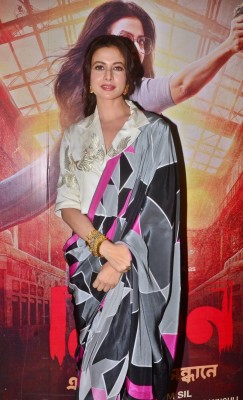
Jill Bilock: Cutting it fine
Jill Bilcock, internationally acclaimed film editor who has also worked with Shekhar Kapur's award-winning film Elizabeth, was in Kolkata recently as a member of the Australian film delegation at the 24th Kolkata International Film Festival. In a free wheeling dicussion with Ranjita Biswas, she talks about her work
Jill Bilcock of Australia has worked in some of the best known films that include Baz Luhrmann’s ‘red carpet trilogy’ - Strictly Ballroom, Romeo and Juliet and Moulin Rouge, Sam Mendes’ Road to Perdition, and Shekhar Kapur’s award winning Elizabeth. She is also the subject of the documentary Jill Bilcock: Dancing the Invisible. In 2001, she was awarded the Australian Centenary Medal for her services to Australian society and film production
Excerpts from an interview:
India is not new to you. You visited the country first when you were quite young and subsequently many more times
Oh yes, I came alone in the 70s on way to London on a shoe-string budget. I made a stop-over in India for two weeks. From Delhi, I decided to go to Kashmir on an impulse. People were very kind and helpful. I went around Pahalgam, Gulmerg etc. without any problem. I went to Mumbai too and stayed in a hotel near the Gateway of India. I enjoy coming back here.
You have worked with Baz Luhrmann’s Moulin Rouge for which you were nominated to the Oscar Awards. Critics find a lot of Bollywood in this film
It’s opulent, it’s full of emotion and dramatics, many of the qualities you find in Bollywood films. Perhaps that’s why.
What about Shekhar Kapur’s long-announced Paani in which you were supposed to work with him.
I don’t know anything about it presently, or whether it will ever be made.
Why did you choose to go for film editing when it was not very common for women to take up this profession at that time?
Actually, I did not take it up consciously. My mother was an English teacher, we lived in Melbourne and there was a fair amount of freedom at home to do what we children liked. Later, after studying art in an institution, I got an opportunity to do a course on film- making. We pretty much dabbled in everything. Afterwards, I found I liked editing and specialised in it.
Why do you think there are fewer women in film editing ?
It’s a very demanding job. Women, like in many other fields which demand a lot of time and attention, find it difficult to cope with family and job. Today there are, however, many talented women film editors who are getting due recognition.
Do you feel that women have a special affinity to film editing?
I think so. Women are good at multi-tasking. They manage homes, look after kids, and work in professions. Film editing is also about multi- tasking. You have to know the different aspects of the film right from storyline, dialogue, music and sound. Though the latter is taken care of by the sound editor, as an editor you have to be familiar with it too. I also get involved a lot in the post-production work.
You have worked in a variety of film genres. How do you approach each assignment?
I sit quietly for at least two weeks to ease myself into the story. I try to find the emotion at the core. If it’s a female director, I try to imagine how she would conceive it, how I can bring out the essence of her thought. The same with a male director. For perceptions change depending on who is the director.
While editing, do you always stick to your decision? Suppose the director doesn’t agree?
Well, I do what I think is the best but if the director doesn’t agree I listen, I don’t fight, and examine why he/she is disagreeing with my view. Perhaps through the discussion the director also gets my view. In a collaborative work like filmmaking it’s no use being at loggerheads
Are you still as involved with the editing process? After all you have spent decades in the profession
Today I am more into supervising. I let someone do the editing but advise and take an overall look. Film editing is a very stressful work. It drains you out though the work is enjoyable. At my age [Jill is 70] I want to take it easy.
( Pix of Jill Bilcock by writer)
Support Our Journalism
We cannot do without you.. your contribution supports unbiased journalism
IBNS is not driven by any ism- not wokeism, not racism, not skewed secularism, not hyper right-wing or left liberal ideals, nor by any hardline religious beliefs or hyper nationalism. We want to serve you good old objective news, as they are. We do not judge or preach. We let people decide for themselves. We only try to present factual and well-sourced news.






